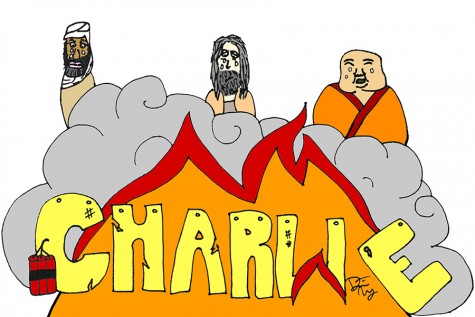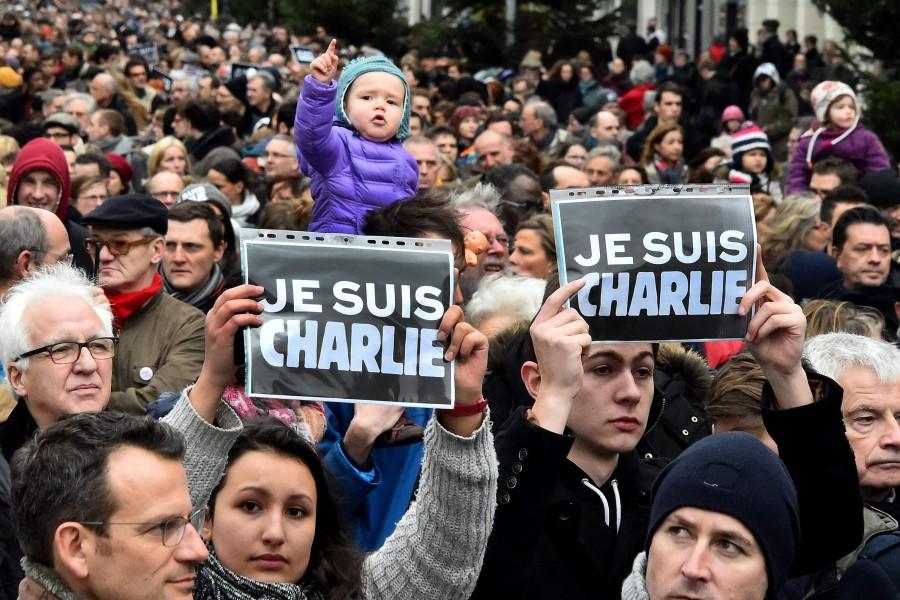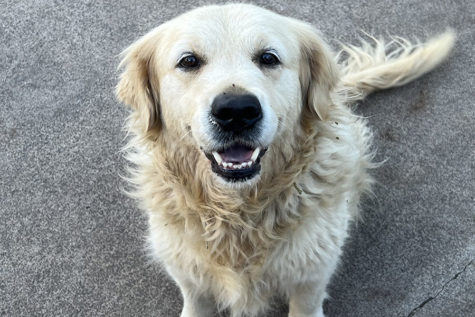‘Charlie Hebdo’ sparks speculation over free speech
Photo by Tribune News Service
Thousands of people gather during a demonstration march in Lille, France, on Saturday, Jan. 10, 2015, in support of the victims of this week’s twin attacks in Paris. Hundreds of extra troops are being deployed aroundParis after three days of terror in the French capital killed 17 people and left the nation in shock. (Patrick Delecroix/Maxppp/Zuma Press/TNS)
January 17, 2015
The recent killing of Paris magazine Charlie Hebdo’s staffers has sparked a worldwide debate over the concept of free speech.
On Wednesday, January 7, two gunmen forced their way into Charlie Hebdo headquarters and executed 12 people there. The magazine’s multiple publishings of satirical cartoons using the Prophet Mohammed as a figure of satire provoked this terror attack.
When you’re given the freedom to do (almost) anything with your words and expression of your ideas, it can be hard to draw a line between what’s acceptable and what’s going too far. With the Charlie Hebdo case, the line seems to be drawn at creative freedom by the magazine’s staff, but their creative freedom is downright blasphemy in the eyes of Muslims and drew unwanted attention from extremists.
Although there’s no doubt that the cartoons published in Charlie Hebdo were offensive to the Islamic religion, the argument is whether or not the magazine was pushing the limits and unnecessarily aggravating a segment of the world’s population by making their deity the dangerous brunt of a joke.
We’re given certain rights; what we do with them is our choosing, but when the purpose is to target and mock a particular person, culture, or religion, lines get blurred and egos are bound to be bruised.
There’s a lot to consider when we in the press choose talking topics. Guaranteed by the First Amendment, American citizens, including both journalists and creative artists, might be allowed to say virtually anything, but whether we should or not…that’s a different story.
Other countries around the world offer similar free speech rights to their citizens, so this is not just a French issue or an American issue, but rather it is a global issue.
I think it’s safe to say that human beings try to be considerate of others’ feelings and the impact our words can have on people. It might not be illegal to say you hate people with mustaches, but when it’s in front of a mustachioed individual, common sense says to steer clear.
We’re given certain rights; what we do with them is our choosing, but when the purpose is to target and mock a particular person, culture, or religion, lines get blurred and egos are bound to be bruised. So it was with the Charlie Hebdo case.
“It’s satire,” people say, “a long-standing creative genre in France.” But, is it “just” humor? The whole purpose of satire is not just for people to laugh. It’s purpose is to have people look at the current state of something — politics, religion, racial inequality — and laugh at its failings.
The history books are full of examples of satire drawing widespread attention to issues. I am reminded of Jonathan Swift’s essay “A Modest Proposal,” which shined a spotlight on the plight of the poorest Irish.
On the strength of the value of satire and backed by a right to free speech, if you want to present something to the public eye that’s going to be seen as offensive, then go ahead. But, and here’s the thing, but if you do, you must be willing to accept the repercussions as well.
Was the terror attack against Charlie Hebdo justified in this sense? Absolutely not; however, all people are entitled to their opinions and their expression of it. A magazine can say it doesn’t agree with a religion. That’s fine. The practitioners of that religion can be offended, express that and argue whatever point it pleases. That’s fine too.
That’s the beauty of free speech: everyone is entitled to his or her own opinion. Charlie Hebdo was and is still perfectly aware of the messages it sends out to the public, and is also accepting of whatever responses its work generates.
In the eyes of Charlie Hebdo’s staff, depicting a religious figure in a satirical cartoon is a statement. Threatening death, which happened before the actual killings occurred, and killing the artists is a statement as well.
Who is making the stronger statement? A publisher who believes in freedom of speech, freedom of thought, and freedom of opinion or homicidal terrorists on a suicide mission to cut down blasphemous infidels?
Only time and history will tell who wins the fight over freedom of expression.
All in all, the words of John Mayer’s song “Say,” although written for the movie The Bucket List, I think is full of meaning in the case of the Charlie Hebdo staff:
“Have no fear for givin’ in
Have no fear for givin’ over
You better know that in the end
It’s better to say too much
Than never say what you need to say again
Even if your hands are shakin’
And your faith is broken
Even as the eyes are closin’
Do it with a heart wide open
A wide heart
Say what you need to say”
As a journalist myself, I have to agree. “Say what you need to say,” but we can’t be surprised if someone else has a something “to say” as well, and know that not everyone in the world went to that kindergarten where we learned to “use your words” to solve problems.
Aloha to the irrepressible and brazen staff of Charlie Hebdo.

Charlie Hebdo editorial cartoon by Destinee Murray.












Kealii Mossman • Jan 26, 2015 at 10:32 am
English philosopher John Stuart Mills once wrote: “…if any opinion is compelled to silence, that opinion may, for aught we can certainly know, be true.”
Think about it… 🙂